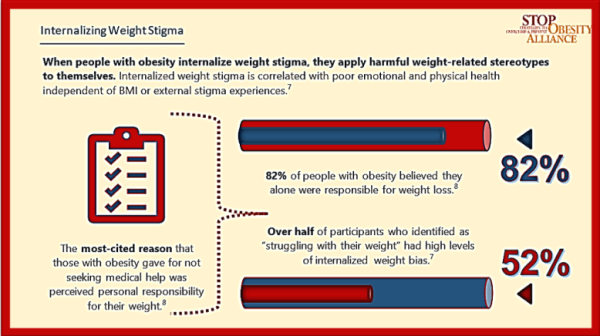As the COVID-19 pandemic continues to affect countries across the globe, more attention has focused on the link between obesity and severe COVID-19 illness. New guidance by the CDC cautions that even those with a BMI of 25-30 may be at increased risk of severe illness. This renewed conversation about the connection between health and weight has led some to argue that the risks associated with COVID-19 could lead to an increased effort to lose weight in those with obesity. Others raise concerns that emphasizing the connection between obesity and COVID-19 blames individuals, which increases weight bias and stigma.
Multiple studies have shown that bias and stigma have harmful effects on persons with obesity. Research suggests that those who experience weight-based discrimination are less likely to seek healthcare and more likely to engage in unhealthy eating behaviors, including disordered eating. Although there are concerns that counseling patients with obesity, especially children and adolescents, to lose weight will also increase the risk of eating disorders, professionally administered weight loss programs pose no significant risk. Some evidence suggests that structured and professionally run obesity treatments can actually decrease the risk and prevalence of eating disorders in a pediatric sample.
Eating disorders and obesity have a complex relationship and often co-occur due to shared risk factors like dieting and adverse life experiences. Individuals with binge-eating disorder have significantly increased odds of having obesity or severe obesity and a higher risk of developing metabolic syndrome. A significant proportion of individuals with bulimia nervosa also experience obesity, and obesity is sometimes considered a risk factor for bulimia. Researchers found that patients with co-occurring obesity and eating disorders were more likely to experience severe eating disorders and psychopathological symptoms. Bariatric surgery candidates who had both obesity and binge-eating disorder were more likely to have mood and anxiety disorders than candidates who only had obesity.
For those who struggle with obesity, disordered eating, or both, the COVID-19 pandemic poses significant challenges. Many people with obesity are experiencing fear associated with their increased risk of severe illness. Others may feel that the way quarantine-related weight gain is portrayed by the media is stigmatizing. Research suggests that those who experienced weight discrimination before the pandemic are more likely to be experiencing depression and distress now. Another study links experiences of pre-pandemic weight stigma to maladaptive eating behaviors like binge-eating. Individuals with depression may overconsume carbohydrates, which have been linked to increased serotonin release, as a form of self-medication and may experience weight gain as a result.
For those who are struggling with obesity or disordered eating during the pandemic, help is available. The National Eating Disorders Association provides COVID-19 resources on their website, as does the Obesity Action Coalition.


